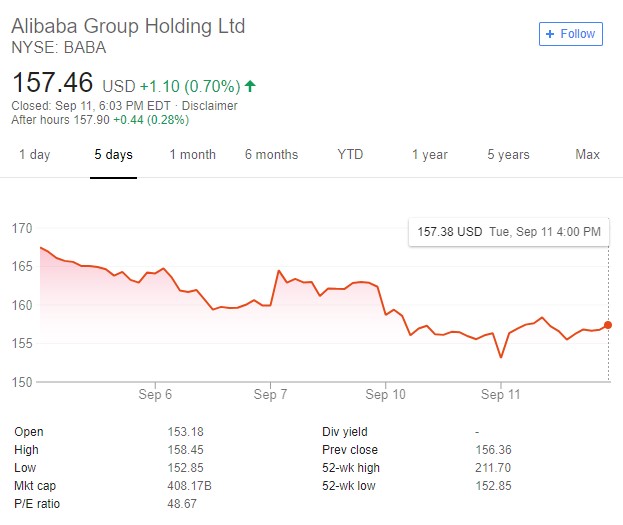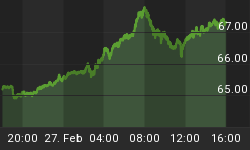Jack Ma, the definitive pioneer of China’s internet industry—is stepping down as executive chairman from Alibaba (BABA), the giant e-commerce company he founded, in the middle of a trade war with the U.S. and as Beijing shoots for high-tech global dominance.
So, investors are now asking: What is Alibaba without their billionaire co-founder?
On Monday, with this uncertainty looming, BABA lost 3 percent in morning trading on the news, hitting their lowest level in more than a year, though things calmed on Tuesday.

(Click to enlarge)
Alibaba is one of the biggest companies in the world now, with a market cap of over $405 billion, but—as The Street puts it, the company is “deeply rooted in the personality of its founder while simultaneously tied to an economy that could be facing its most serious crisis”.
While BABA will remain on the board until 2020, his replacement as chairman will be the company’s current CEO, Daniel Zhang. The torch will be passed on September 10, 2019—Alibaba’s 20th anniversary.
"I have put a lot of thought and preparation into this succession plan for ten years," Ma wrote in a letter to Alibaba customers and shareholders, as reported by CNBC. "This transition demonstrates that Alibaba has stepped up to the next level of corporate governance." Related: Bear-Market Risks At Highest In Nearly 50 Years
But can Zhang handle what’s to come? He’s a relatively unknown figure replacing a legend, and the pressure will be immense because the internet is now definitively one of China’s strategic industries.
And this is a highly significant classification in China. It’s also tied to the ongoing and ever-intensifying trade war between the U.S. and China.
Even if investors are unsure, Ma, is confident—after all, he mentored Zhang. In his letter, he said Zhang’s “analytical mind is unparalleled, he holds dear our mission and vision, he embraces responsibility with passion, and he has the guts to innovate and test creative business models”.
Twenty years has been enough for Ma, who was quoted by the South China Morning Post as saying he’d “rather die on the beach than in my office”, and the richest man in China’s “happiest moment in life was making just 91 yuan ($13.26) per month as a poor school teacher”.
Nor is everyone else shaken.
Speaking on CNBC’s ‘Squawk Alley’, Jeff Richards, GGV Capital managing partner and an early backer of Alibaba, said he wasn’t worried for the company at all.
Still, they are big shoes to fill at a very difficult time for Chinese tech.
Ma created a company that became the very definition of Chinese e-commerce, and today, it accounts for some one-fifth of the massive country’s retail sales. And it’s not just about Alibaba. There’s also the company’s 33-percent stake in payments giant Alipay, which Ma also helped found.
In the meantime, Alibaba’s also shrugged off the trade war. In the last week of August, it said it wasn’t concerned at all, with data suggesting a shift away from U.S. products underway, while Chinese exports to the U.S. remaining steady. But already, there are signs that exports are now slowing, with new data coming in, and it’s a wait-and-see game as Trump threatens yet another round of tariffs next week.
By Michael Scott for Safehaven.com
More Top Reads From Safehaven.com
















